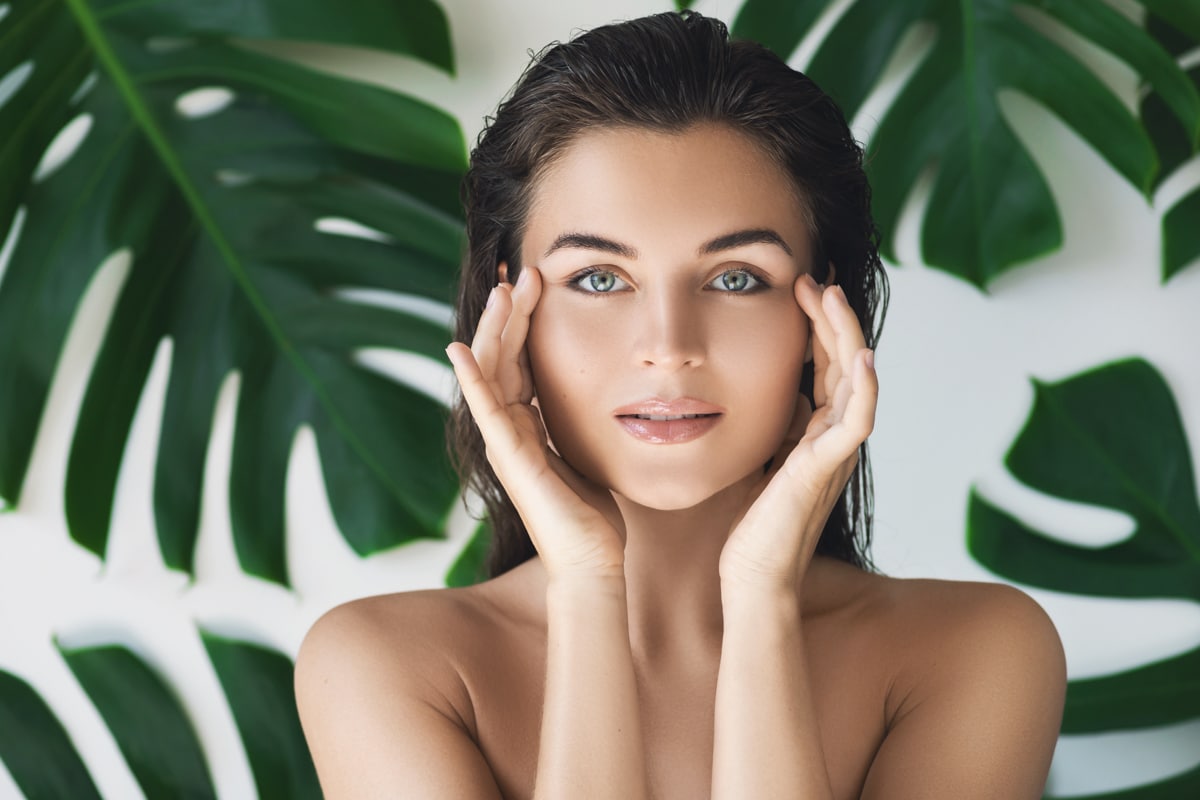It happens to all of us. One day we wake up and realize the youthful glow of our teens and early adulthood is slipping away.
And most of us aren’t going to go down without a fight.
Many products advertise anti-aging properties, and in this article, we look at Cetaphil face lotion to determine whether it’s an excellent weapon to battle Father Time.
Dry Skin & Aging
Many factors contribute to skin looking older as we age, including sun exposure, lifestyle, diet, genetics, and dry skin.
Dry skin makes your skin look rough and feels scratchy and flaky. And while it’s often associated with old age, it can affect both young and old alike.
Dry skin is a common problem for us as we age. External factors like spending too much time in dry, indoor air, poor diet, drinking too much alcohol, using soaps and cremes that cause dryness, and internal factors like losing oil glands and having a genetic predisposition can affect our skin.
The symptoms of dry skin are sometimes seasonal, as during winter when the air indoors is dry, and for some people, the condition persists all year long.
Symptoms of dry skin include:
- Flaky skin
- Itchiness
- Cracks and fine lines
- Deep cracks that bleed
- Scaling or peeling
As part of an anti-aging skin care routine, many people look for body lotion solutions or a face moisturizer to make skin smooth and supple again. Cetaphil face lotion is a product many rely on and love as a critical staple of their skin care routine for its numerous benefits.

Cetaphil Key Ingredients for Anti Aging & Dry Skin
To understand why so many people rely on Cetaphil is by looking at its ingredients and how they alleviate the nuisance and discomfort of dry skin.
Cetaphil Face Lotions We Love
-
$27.36 ($3.42 / Fl Oz)Buy on Amazon
by CETAPHIL
We earn a commission if you make a purchase, at no additional cost to you.
03/06/2024 08:34 pm GMT
Vitamin E
The first ingredient to mention is the antioxidant Tocopheryl Acetate, a form of vitamin E. Vitamin E is an antioxidant used in dermatology for over 50 years and in numerous cosmetics and skin care products.
According to the US National Library of Medicine National Institute of Health in a study on vitamin E in dermatology:
“Topical vitamin E has emerged as a popular treatment for a number of skin disorders owing to its antioxidant properties.”
Vitamin E works by reversing the effects of free radicals, which cause cell damage. Many skin care products contain vitamin E because it’s not something the body produces by itself, and many people don’t get enough of it from their diet.
Glycerin
The next ingredient worth mentioning is glycerin, a natural oily liquid derived from animal and plant resources. Glycerin is a valuable substance in cosmetics and anti-aging products for its ability to draw water to the outer skin layer for hydration. Hydration is key to keeping dry skin at bay, reducing under-eye puffiness, and filling in wrinkles.
Glycerin is one of the most used ingredients in moisturizers and lotions because of its hydration properties, making it especially useful to treat dry skin.
Panthenol
The last key ingredient in Cetaphil that has moisturizing and anti-aging properties is Panthenol, derived from vitamin B5. Like the other ingredients we mentioned, you can find Panthenol in cosmetics and skin care products.
Skin care products like topical creams and moisturizers containing 1% to 5% panthenol show promising results for solving dry skin and other irritations.
The bottom line is the key ingredients in Cetaphil are proven effective on dry skin and can work as part of your anti-aging routine.
Next, let’s look at how Cetaphil works on various skin types.

Sensitive Skin
When people talk about sensitive skin, they usually mean they get a reaction like burning, itching, or redness when exposed to skin care or household products that come into contact with their skin.
People who suffer from rosacea, psoriasis, or eczema have sensitive skin.
Many things can contribute to sensitive skin, including genetics, so it’s best to get examined by a dermatologist to determine if you have sensitive skin and what the cause might be.
Sensitive skin affects men and women, and while many people may think men aren’t as prone to this condition as women, the opposite is often true.
Yes, men have thicker, tougher skin than women, but it’s also naturally drier, making them more likely to suffer skin irritation from UV exposure, environmental conditions, and repeated shaving.
Women primarily suffer from skin irritation stemming from lotions, cleaning products, and cosmetics that contain harsh ingredients. Many cleansers contain a chemical called sodium lauryl sulfate, which is a harsh emulsifier found in certain Cebody wash products.
Soothing Sensitive Skin
Because these skin irritations often come from overusing cleansers and soaps, many experts recommend washing with plain water once a day because harsh cleansers can strip away the protective lipids and proteins that keep skin healthy.
Also, if you want to try a new product, it’s best to test it on a small area of your body, preferably on your inner arm, to see if there’s a reaction and leave it overnight. It helps you determine if it is safe to use on your skin. If you wake up and have no reaction, you should be good to go.
Lastly, when washing your face, avoid using washcloths or loofahs because they often worsen the situation, and use warm water, not hot.
Dry Skin
As we mentioned above, dry skin is a problem many of us experience as we age. And like sensitive skin, there are many reasons your skin might become overly dry and flaky. The best way to determine the cause is to speak to your dermatologist because it might be a medical condition such as an underactive thyroid or stem from dermatitis or psoriasis.
However, if you are suffering from dry skin, here are a few things you can do to solve it.
You want to avoid over-washing and harsh cleansers if you have sensitive skin. After washing your face, you can use a face moisturizer that contains ingredients like glycerin, a key ingredient in Cetaphil, to lock in the moisture.
If you experience cracking skin that causes bleeding, consult with your family doctor or a dermatologist to determine the best, safest treatment options.

Oily Skin
Another common skin problem many people suffer from is oily skin.
Everyone has sebaceous glands that produce sebum, an oily substance that moisturizes and protects the skin. However, some people produce too much sebum, which clogs pores, gives skin a greasy appearance, and can cause acne.
And while you might think using a face moisturizer like Cetaphil is counterproductive, the opposite is the case.
When treating these skin conditions, you can see a pattern develop. And with oily skin, you want to wash your face regularly while avoiding products with harsh chemicals or cleaning agents.
Light exfoliation eliminates the dead skin cells and unclogs pores to keep acne from forming.
Here’s where using a face moisturizer is essential. Washing and exfoliation remove the dead skin cells, but it also dries the skin, which leads to further problems. So, it’s crucial for maintaining healthy, clear skin to apply a light moisturizer after your washing routine.
All of the skin conditions mentioned above contribute to making you look older, so incorporating products like Cetaphil face lotion into your routine can help keep your skin clean and healthy and minimize the effects of the aging process.
Developing an Anti Aging Skin Care Routine
Now that we understand some of the skin conditions that lead us to look older, let’s talk about how we can fight the aging process and regain some youthful glow.
Good skin care is essential not only to slow down the effects of aging, but it’s easier and less costly to prevent problems than it is to correct them down the road. Preventing the effects of aging is better than treating it once you have already experienced it.
Lastly, maintaining healthy, vibrant skin goes a long way to improving your self-esteem and self-confidence.
Regardless of your skin type, dermatologists recommend developing a daily regimen to maintain healthy, clear skin that includes cleansing, treating, and moisturizing. Also, for best results, it’s best to perform this routine in the morning and before bed.
The Morning Routine
The first step in your anti-aging routine is to start fresh in the morning with a deep cleanse to remove the dead skin cells, oils, and dirt built up during sleep. You must remain gentle during this and every step; don’t scrub yourself raw or use harsh cleansers because that breaks down your skin’s natural protective barrier and makes things worse.
If you have dry or sensitive skin, wash your face before going to bed with your regular soap or cleanser, but use warm water in the morning for a quick rinse.
Depending on your age and how well you slept, you might consider adding an eye creme to your morning routine to reduce puffiness, dark circles, and wrinkles.
Lastly, use a face moisturizer to keep your skin hydrated throughout the day. If you have dry skin, opt for a light moisturizer like a lotion or gel that quickly gets absorbed. If you have dry skin, consider using a thicker face cream that contains hyaluronic acid to give structure and support to the skin.

Cetaphil Face Lotions We Love
-
$27.36 ($3.42 / Fl Oz)Buy on Amazon
by CETAPHIL
We earn a commission if you make a purchase, at no additional cost to you.
03/06/2024 08:34 pm GMT
The Before Bed Routine
Your nighttime skin care routine is essential to ensure your skin gets enough nutrients to repair itself while you sleep.
Like the morning, finish your day with a cleanser to remove makeup, dirt, dead skin cells, and oil. Use the same cleanser you used in the morning and, again, be gentle.
Once your face is clean, you can add toner if you want, but if you do, be sure to put it on before you moisturize.
Next, if you use eye creme in the morning, do so before bed. It is an excellent habit to get into because it trains the skin around your eyes to respond more quickly to the changes from using the product.
Many dermatologists recommend applying acne treatment at night for maximum effect if you have acne or a few blemishes.
Lastly, it’s time for moisturizer. Moisturizing creme at night is more important than doing it in the morning (although you shouldn’t neglect it either). It replenishes what your skin loses during the day and facilitates hydration as you sleep.
Cetaphil Face Lotion For Your Anti Aging Routine
As we’ve seen, Cetaphil face lotion contains the key ingredients to help you get clearer, healthier skin and stave off the aging process as much as possible.
The Cetaphil Oil-Free Hydrating Lotion is a no-fuss, reliable drugstore moisturizer that won’t disappoint — and easy to reach for in a pinch or on a quick errand run.
Cetaphil vs. Cerave
Finding the perfect product is challenging. There are many anti-aging and skin care products available. If you’re figuring this out yourself, you may waver between two well-known, seemingly similar products, Cetaphil Face Lotion and Cerave Daily Moisturizing Creme.
We’ve spoken at length about Cetaphil; let’s look at Cerave and see how it compares.
Cerave Daily Moisturizing Lotion is a lightweight night skin care cream with niacinamide, a form of vitamin B3 found in meat, eggs, milk, and green vegetables.
According to WebMD
Niacinamide is required for the function of fats and sugars in the body to maintain healthy cells.
Some people use niacinamide to treat skin conditions like acne and discoloration; however, the current scientific data is lacking to support its usefulness.
Like other moisturizing cremes, Cerave locks in your skin’s moisture for better hydration during sleep to keep it soft and supple.
Another critical ingredient in Cerave is hyaluronic acid, a sugar produced by the body and necessary to maintain skin plumpness and volume.
Cerave advertises its MVE technology, which delivers a steady stream of moisture throughout the night.
Lastly, Cerave contains ceramides, lipids produced by your skin to help maintain its natural barrier to protect against moisture loss.
Because hyaluronic acid decreases as you age, using a daily moisturizing creme is an excellent way to replenish and maintain levels.
As mentioned, both products claim to provide similar results. Both are fragrance-free and available at your local drug store.
The ceramides in Cerave make this product stand apart from its competitors.
Both Cerave and Cetaphil are safe for most skin types, and both advertise to maintain your skin’s optimal pH level. They both feature SPF sunscreen protection –– Cetaphil with SPF 15 and Cerave with SPF 30 (the higher number is more effective).

So, which one is better?
Well, that’s a tough call since these products are dermatologist tested and recommended for various skin types. However, some experts prefer Cerave because of the ceramides and niacinamide.
But that’s only part of the story. Depending on your skin type, you may benefit from using one of these over the other.
Cerave seems to be a better choice if you’re combatting aging skin because of their nighttime release technology and because ceramides are well-known for their anti-aging properties.
If you suffer from acne, again, the ceramides in Cerave make this a better option because they’re better suited for fighting and preventing acne.
People with sensitive skin are better off with Cetaphil because it contains fewer ingredients, which means there’s less chance it will irritate. Also, Cetaphil’s ingredients are infused with more natural elements to reduce flare-ups further.
Lastly, people that suffer from skin conditions like eczema or rosacea tend to see better results with Cerave because the ceramides are better suited for dealing with these issues.
However, the bottom line is that both products are dermatologist tested and recommended, and it’s safe to try out both to see which one works for you or consult your skin care professional.
In Conclusion
Aging, unfortunately, is a losing battle, but that doesn’t mean we have to go down without a fight.
Many things cause the skin to age, including time, the environment, sun exposure, diet, and genetic factors.
The best way to keep the effects of aging at bay is to reduce your skin’s exposure to the sun by using products with a built-in sunscreen and avoiding getting sunburned. If you’re bent on getting a tan, use a tanning product instead of baking under the sun or using a tanning bed.
Also, eating a healthy diet is key to maintaining clear, young-looking skin. Studies show that avoiding sugar and processed foods and eating a more plant-based diet is key to keeping your inside and outside health and preventing premature aging.
Limit your alcohol consumption because drinking alcohol dehydrates your skin and makes you look older.
Lastly, get into a good skin care regimen by washing your face every morning when you wake up and every night before bed. After, apply a moisturizer or face creme to keep your skin hydrated.
Even if you already have signs of aging, changing your habits and making lifestyle changes can repair some of the damage and improve how you look and feel. Also, don’t be shy about seeing a dermatologist or skin care professional and ask whether getting a facial or a chemical peel can benefit you.







